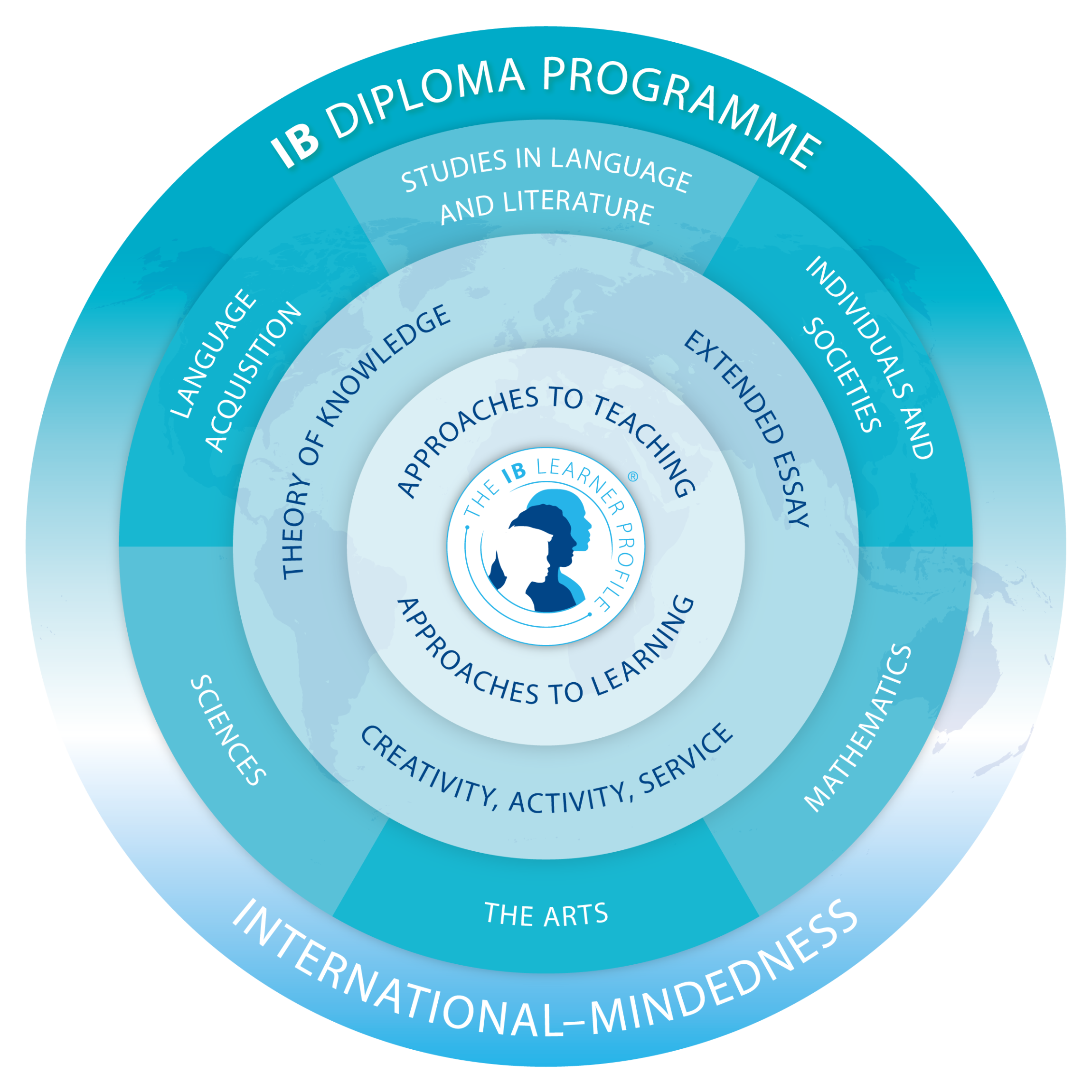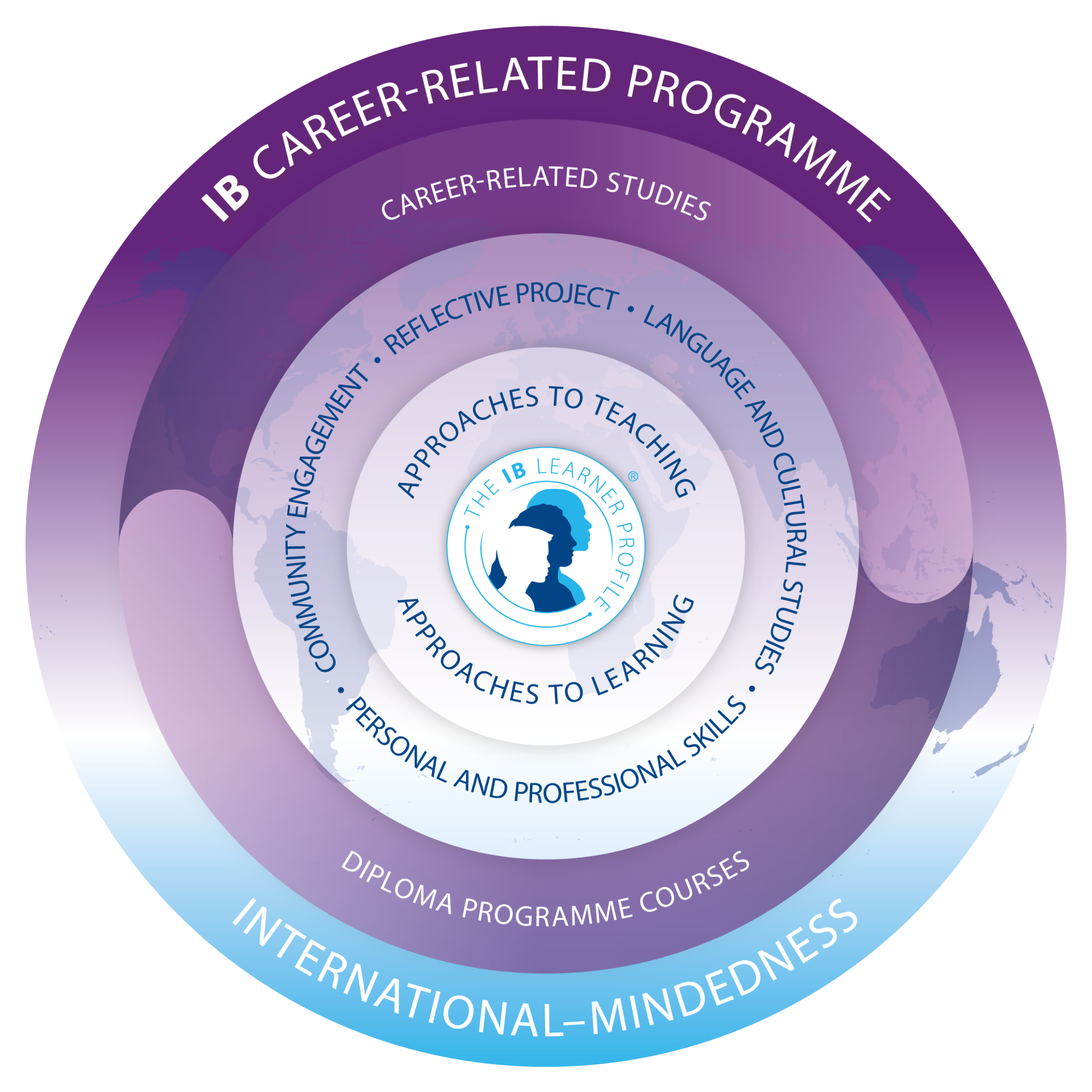Students choose to either study a broad-based International Baccalaureate Diploma Programme (IBDP) or to focus their studies and follow a specialised vocational pathway which centres around one or more BTEC qualifications. IBDP and BTEC classes are capped at 16. These small classes enable students to grow as learners in a supportive and nurturing learning environment.
International Baccalaureate Diploma
At KGV, we offer a range of International Baccalaureate (IB) programmes to meet our students’ diverse needs and aspirations. In addition to the IB Diploma Programme (IBDP), we are proud to offer the IB Career-related Programme (IBCP).
The IB Diploma consists of 6 optional subjects and 3 core subjects (ToK – Theory of Knowledge, EE – Extended Essay and CAS – Creativity, Activity, Service). The optional subjects are split into 6 groups – in general terms students must take one subject from each of the first 5 groups and one additional subject from group 6 or a second from group 1-4). There are some exceptions to this and these are shown below. Most subjects are offered at Higher Level (HL) and Standard Level (SL). Students must choose 3 HL and 3 SL subjects. All students take the 3 core subjects. The diagram illustrates how this works:

Common Combinations (others are possible but would need to be discussed)
One subject from Group 1 -6;
One subject from Group 1 – 5 and a final subject from Group 1 – 4;
One subject from Group 1,2,5, plus the ESS and two subjects from Group 6;
One subject from Group 1,2 5, plus the ESS and a final subject from either Group 3 or 4.
Students may also choose to study a Bilingual Diploma by selecting 2 subjects from group 1. Students following a Bilingual Diploma would not need to select a subject from Group 2.
Considerations
It is not recommended for students to take more than one new subject.
Do not take an ab initio language as an ‘easy’ option.
The Language dept have clear recommendations (see relevant information on Lionel)
- Environmental Systems and Societies (group 3 & 4) is an interdisciplinary subject which means that students do not need to study a second subject from either of the groups that it represents as it meets the requirements of both subject groups in a single choice.
Key Components of the IBCP:

- IB Career-related Programme (IBCP)
The IBCP is an innovative two-year educational framework for students in their final years of secondary education. It balances academic and practical learning, preparing students for higher education and the professional world.
The IBCP is offered in over 370 schools across 50 countries and is the fastest-growing IB programme worldwide.
- Career-related Study:
Students undertake a career-related study (BTEC) aligned with their interests and aspirations. At KGV, we offer pathways in:
• Sport
• Performing Arts
• Business
• Creative Media
• Visual Arts
IB Diploma Programme (DP) Courses:
Students take at least two DP courses, providing academic depth and breadth to their studies.
- IBCP Core:
• Personal and Professional Skills
• Service Learning
• Reflective Project
• Language Development
Benefits of the IBCP:
• Tailored learning that combines academic skills with practical, career-related knowledge
• Development of critical thinking, communication, and personal development skills
• Preparation for further/higher education, apprenticeships, or employment
• International recognition by universities worldwide
Eligibility and Selection:
The IBCP is suitable for students who have a clear idea of their career path and are ready to begin specialised study. Interested students should consult with our IBCP Coordinator to discuss their suitability for the programme.
University Recognition:
For information about university recognition of the IBCP, please visit the IB’s recognition website or contact our Higher education and careers team at careers.office@kgv.edu.hk.
Further Information:
For more information about the IBCP at KGV, please visit The IB Career-related Programme or contact our IBCP Coordinator Mr. Jack Chappell at jack.chappell@kgv.edu.hk.
BTEC – Business & Technology Education Council (see HERE for more information)
BTECs are career-focused qualifications taken by over 1 million learners every year around the world. They have been developed in partnership with educators, employers and governments, and provide a flexible pathway – combining knowledge, skills and their application to real-life scenarios. They are an excellent way to progress to university.
Click HERE for BTEC university recognition.
KGV currently offers BTEC qualifications in the following subjects: Sport; Business; Art & Design; Creative Media; Performing Arts; Information Technology (IT)
Students can either choose to study an Extended Diploma (1080 guided learning hours) in a single BTEC subject or choose a combination of a Diploma (‘major’ – 720 guided learning hours) in one BTEC subject and a Subsidiary Diploma (‘minor’ – 360 guided learning hours) in a second BTEC subject depending upon their interests.
In addition, students may also select up to 2 standard level (SL) IB courses to study alongside their BTEC qualifications (see IB Diploma below for courses available).
We currently offer the following 3 extended BTEC programmes or combinations of Diploma and Subsiduary subjects to make up 18 units.
|
BTEC sizes |
Equivalent International A level sizes |
|
Subsidiary Diploma (360 GLH) |
1 International A level |
|
Diploma (720 GLH) |
2 International A levels |
|
Extended Diploma (1080 GLH) |
3 International A levels |


